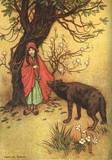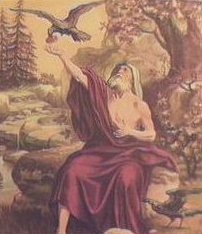 ChrisD was the only one brave enough to submit some variations on what one could do with a wolf tale and a wolf Scripture. Thanks, Chris. Anyone else game?
ChrisD was the only one brave enough to submit some variations on what one could do with a wolf tale and a wolf Scripture. Thanks, Chris. Anyone else game?
Okay, off the top of my head, hereâs how Iâd begin to go about fashioning a retelling with the given parameters:
- Pick the tale: Red Riding Hood
- Find a Related Scripture: How about 1, from Matthew, âBeware of false prophets, who come to you in sheep’s clothing but inwardly are ravenous wolves.â Or 2. the one ChrisD mentioned: âThe wolf shall dwell with the lamb.â
- How can one deviate from the original?
a. with Scripture 1: The âwolfâ could be an actual false prophet (ie, heâs out there in the woods trying to make converts to his askew religion. It can be set at any time: ancient Holy Land, American Southwest (with Native imagery), in a city, on another planet where the wolf is a whole different kind of critter.
And Red, maybe young but not so little, is the one the âwolfâ is ravenous to convert, and perhaps do moreto. If we set it on another planet, say a colony, the false teaching might relate to the intentions of the homeworld (or a Pope or a missionary group). The âwoodsmanâ could be an itinerant space-apostle who checks on the spiritual well-being of colonists and, maybe, does some botanical work (woods work) to support his religious wrok. Grandma could be way across the planet or on a satellite or somewhere else where travel is dangerous. In a sci-fi setting, the possibilities can be pretty interesting. Perhaps the âwolfâ is actually a native to the world (a non-colonist) who can assume the shape of humans, but in his real shape, is more beastly?
b. With Scripture 2: The âwolfâ is a werewolf, who when he is a man is the woodsman, so heâs both the good and the bad guy. Maybe Scarlett has been orphaned by the werewolf, but has fallen in love with the man part, and sheâs heading to some old hermit ladyâs house on the other side of the woods for the magical cure. So, sheâs actually in danger from her own beloved, who is both wolf and lamb, as she takes the risk of being in the woods on a full moon night for a good reason: itâs the only time the particular herb for his cure can be harvested.
4. Ending? For fairy tale retellings, ending donât have to be chipper and HEA (although, I really like HEAs). You can have grandma die/be eaten/be transmogrified/be possessed by an alien/etc. You can have the wolf win over Red, but have the woodsman learn something that will nevertheless save the colony. You can have the werewolf cured and marry Scarlett. Itâs up to you.
Thatâs just one way to take a tale, find a Scripture that correlates in tone or via some key word, and then play a what-if game to find your story. Enough of that. I think you get the drift.
Now, letâs begin exploring what C.S. Lewis did with the myth of Cupid(Eros) and Psyche in his acclaimed novel TILL WE HAVE FACES.

She hurts so much. She is confused. She doesn’t know where she is. She won’t thank you. She will blink and sit up.
First, letâs review the influential and quite emotional myth that inspired various fairy tales (Beauty and the Beast, notably) and Lewisâ novel. You can read it here: http://www.pitt.edu/~dash/cupid.html
âA certain king and queen had three daughters. The charms of the two elder were more than common, but the beauty of the youngest was so wonderful that the poverty of language is unable to express its due praise. The fame of her beauty was so great that strangers from neighboring countries came in crowds to enjoy the sight, and looked on her with amazement, paying her that homage which is due only to Venus herself. In fact Venus found her altars deserted, while men turned their devotion to this young virgin. As she passed along, the people sang her praises, and strewed her way with chaplets and flowers.
This homage to the exaltation of a mortal gave great offense to the real Venus. Shaking her ambrosial locks with indignation, she exclaimed, “Am I then to be eclipsed in my honors by a mortal girl? In vain then did that royal shepherd, whose judgment was approved by Jove himself, give me the palm of beauty over my illustrious rivals, Pallas and Juno. But she shall not so quietly usurp my honors. I will give her cause to repent of so unlawful a beauty.”
We all know that arousing the jealousy of the Greek gods meant trouble. And Psyche is about to experience an abundance of woe because of her beauty. She sends her son, Cupid, to so afflict Psyche that she will fall in love with âsome low, mean, unworthy being, so that she may reap a mortification as great as her present exultation and triumph.”
Cupid, however, is as startled by her beauty as the rest, and ends up inflicting himself with his own arrow. Nevertheless, wrathful Venus (Aphrodite) makes sure no one falls in love with Psyche. Her sisters marry, but Psyche is cursed. Her parents ask the oracle whatâs up. The oracles says she is fated to marry a monster. She is taken to the designated mountain, where Zephyr carries her to a palace of great beauty and constant delight. Her husband is unseen by her, but she is happy in her marriage. After a time, however, she comes to miss her family. Her invisible hubby allows for the sisters to visit.
The golden palace and its delights inspire great jealousy in Psycheâs sisters, who then begin to poison her mind about her invisible husband, reminding her that she was prophesied to marry a hideous monster. âTake our advice,â they tell her. âProvide yourself with a lamp and a sharp knife; put them in concealment that your husband may not discover them, and when he is sound asleep, slip out of bed, bring forth your lamp, and see for yourself whether what they say is true or not. If it is, hesitate not to cut off the monster’s head, and thereby recover your liberty.”
She does as instructed, and when she beholds her husband at last, he is a man of great beauty, a true god. She drops of oil from her lamp spill upon him. Cupid awakens. As he flies from her, he says, â”Oh foolish Psyche, is it thus you repay my love? After I disobeyed my mother’s commands and made you my wife, will you think me a monster and cut off my head? But go; return to your sisters, whose advice you seem to think preferable to mine. I inflict no other punishment on you than to leave you for ever. Love cannot dwell with suspicion.”
The sisters gloated inwardly to see their sister returned to them, scorned. They each decide to try and become Cupidâs next beloved, going up to the high mountain as Psyche did. But Zephyr did not bear them aloft. They fell off the mountain and died.
Psyche begins her quest for Cupid. She happens upon a neglected temple of the goddess Ceres (Demeter). She tidies it and wins the goddess’ favor and this advice: âGo, then, and voluntarily surrender yourself to your lady and sovereign, and try by modesty and submission to win her forgiveness, and perhaps her favor will restore you the husband you have lost.”
Venus, in no forgiving mood, berates Psyche and decrees, âYou are so ill favored and disagreeable that the only way you can merit your lover must be by dint of industry and diligence. I will make trial of your housewifery.”
Psyche undergoes two tests, each time receiving the compassion and assistance Venus denied instead from ants and from a river god. Venus, vexed, sets her a third task: âHere, take this box and go your way to the infernal shades, and give this box to Proserpine and say, ‘My mistress Venus desires you to send her a little of your beauty, for in tending her sick son she has lost some of her own.’â
Psyche, despairing, figures the fastest way to the Underworld is to die. She sets off to kill herself. But yet again, she receives aid, this time from a voice in the tower telling her how to find the cave down to Hades, how to calm Cerberus, and how to pay Charon. And lastly, says, â”When Proserpine has given you the box filled with her beauty, of all things this is chiefly to be observed by you, that you never once open or look into the box nor allow your curiosity to pry into the treasure of the beauty of the goddesses.”
Psyche accomplishes her task, but hoping to regain some of the beauty she lost through her trials and suffering, she opens the box to take some of Proserpineâs beauty for herself. âSo she carefully opened the box, but found nothing there of any beauty at all, but an infernal and truly Stygian sleep, which being thus set free from its prison, took possession of her, and she fell down in the midst of the road, a sleepy corpse without sense or motion.â
Cupid, now recovered, comes and removes the sleep from her. He pleads with Jupiter (Zeus) on his and Psycheâs behalf. They are allowed to wed. Psyche is given immortality. âThus Psyche became at last united to Cupid, and in due time they had a daughter born to them whose name was Pleasure.â
Between now and next Friday, consider what you would do with this story if you retold it. Come back for the discussion on what Lewis did.

































 ChrisD was the only one brave enough to submit some variations on what one could do with a wolf tale and a wolf Scripture. Thanks, Chris. Anyone else game?
ChrisD was the only one brave enough to submit some variations on what one could do with a wolf tale and a wolf Scripture. Thanks, Chris. Anyone else game?

 Do not throw stones at ravens.
Do not throw stones at ravens.


